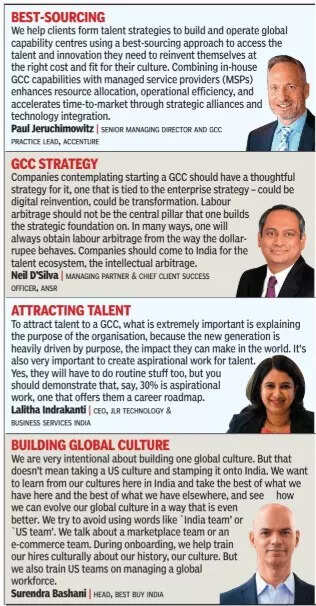ARTICLE AD BOX

It wasn’t long ago that GCCs (global capability centres) were seen as competing with IT and engineering R&D services companies, a view furthered by global CIOs who were increasingly insourcing work. For many of us, that perception began to change when, mid last year, Accenture entered into a partnership with ANSR, a consulting company that’s helped set up some 175 GCCs in India. Over the past few months, every major services company has aggressively been establishing GCC practices.So, the question today is, what part of the work should a global enterprise do in its GCC, and where should it partner with services companies. And that was a big part of the discussion we held last week on reinventing GCCs.Paul Jeruchimowitz, senior MD and GCC practice lead at Accenture, dist i n guished between what he called “talent play” and “technology play”. He said a GCC should focus on the former, using talent to build distinctive capabilities linked to the enterprise’s strategic objectives. And managed service partners should handle the high-volume, repeatable, measurable, transactional work with the technologies they have a deep understanding of. He said enterprises haven’t yet automated a lot of this kind of work, and they may not have the wherewithal to invest in the level of technology required to bring in automation, AI, and analytics. “Most GCCs would tap into a partnership model to bring that,” he said.Neil D’Silva, managing partner & chief client success officer at ANSR, said while GCCs tend to be a “walled garden” within which they do work that’s core to the enterprise, including those involving IPs, service providers like Accenture are key to enabling scale, flexibility, resilience and speedto-market, all of which are essential to every enterprise, given the dynamic environment they operate in.

.
SHARED VALUE CREATIONLalitha Indrakanti, CEO of JLR (Jaguar Land Rover) Technology & Business Services India, described the relationship as “shared value creation”, and noted that a GCC will never have all the skills in-house, given how rapidly skill requirements are changing, and that necessitates partnerships. She said there will be occasions when a GCC wants to do a proof-ofconcept (PoC) for which it does not have skills in-house, and for which it needs to go to a service partner. And if the experiment proves successful, it then needs to decide whether to scale it with the partner, or create skills in-house to do that.Surendra Bashani, head of India for Best Buy, one of the biggest consumer electronics retailers in the US and which established a GCC in India a year ago, makes a similar point. He noted that a new GCC may want to deliver on a major enterprise priority, but will take time to ramp up the talent required. That may then require a partnership with a service provider. “There’s multiple heuristics – everything from cost to capabilities, to your purpose – that change, depending on the lifecycle of the GCC,” he said.Paul said he’s speaking to a global retailer with a GCC who wants to develop an agentic merchandising solution, but does not have talent in-house. “There’s an idea of a build, operate, transfer (BOT) of this new capability inside the GCC,” he said, noting that models like these will evolve.Lalitha said given the enterprise may have a GCC and multiple partnerships, it’s also critical to create a placement strategy – what work to place where. “I’ve seen a lot of confusion within organisations on who they should go to. Once a playbook is made, it’s also important to socialise it in the headquarters,” she said.



.png)
.png)
.png)
















 4 hours ago
3
4 hours ago
3








 English (US) ·
English (US) ·